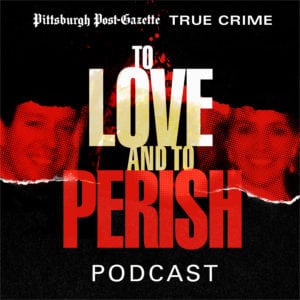 A dentist, a woman, a police officer and a deadly love triangle. The Pittsburgh Post-Gazette’s newest season of its true-crime podcast, “To Love and To Perish,” launches on September 12. This season follows last year’s award-winning podcast, “Three Rivers, Two Murders.”
A dentist, a woman, a police officer and a deadly love triangle. The Pittsburgh Post-Gazette’s newest season of its true-crime podcast, “To Love and To Perish,” launches on September 12. This season follows last year’s award-winning podcast, “Three Rivers, Two Murders.”
Mike Fuoco and Ashley Murray are the brains behind the project. Though from different generations—he’s a baby boomer, she’s a millennial—he says they complement each other’s work well. “She knows millennial things and I know baby boomer things,” he laughs. He says she often helps with tweaking the script for cadence and picks on his Pittsburgh pronunciation of things.
“She’s a really great producer,” he says. “She’s a reporter and a writer, she understands about writing.”
Mike had no podcast experience leading up to Three Rivers. He had built his career first as a police reporter, then as an enterprise reporter. He has been at the Post-Gazette for 34 years. He began reporting on the murders as he would any other story—but while speaking to the deceased boys’ families, the emotion in their voices struck him.
His editor, Virginia Linn, recommended listening to “In the Dark.” He put his headphones in and within 10 minutes, knew he needed to create a podcast. “I didn’t think of the fact that I had never written a podcast, never hosted one, didn’t have the equipment, didn’t have a producer,” he says. “I was just excited, having interviewed the families and having heard the emotion in their voices.” He pitched it to the editor (who agreed it was a good idea) and reached out to Ashley Murray, a grad student with podcasting experience who was an intern at the time, to be the producer.
Flash forward to season two and Ashley is now a full-time staffer and the dream team is back together for “To Love and To Perish.”
Mike says this time, they’re more efficient at the podcasting process. In season one, he says, “I didn’t know what I was doing, I was basically writing newspaper stories and reading them out loud.” This time around, he’s written all five episodes in advance and then records. It has made the editing process smoother.
His writing style focuses on being conversational and avoiding multi-syllable words. He advises writing as if you’re telling a story at a bar. He also adds in cliffhangers at the end of each episode, which is something you don’t see in newspaper writing. But at the end of the day, he is doing what he does best—telling an interesting story in an interesting way. “I see myself as a storyteller,” he says. “The only difference here is that I’m speaking. Once I realized that, I wasn’t focused on how different the process is.”
He says he feels like a police reporter again. “It’s a really cool and frightening feeling at the same time,” he says. “It’s a very creative challenge and it’s been wonderful and reinvigorating.” During season one, he was worried it was going to be a disaster. “[I said,] ‘There will be one listener and that’ll be me,’” he laughs. “I’m much more confident this time.”
Unlike season one, this crime has been solved. “Instead of a who-done-it, it’s a why-done-it,” says Mike. It focuses on the intersection of people’s lives and fates.
He says they’re hoping to monetize the podcast in season two – they have had some interest from a national advertiser. But that’s not why they launched the podcast. “The main reason we did it was we felt we had an interesting story that we could tell in a very interesting way. As with most things we publish – be they on the web or in print – we like to think that you can’t get that story told anywhere else like it’s being told [here],” he says. “The Post-Gazette is a really good paper and our goal is to inform and entertain. We journalists don’t see it as a job, we see it as a calling.”

Contributing writer

